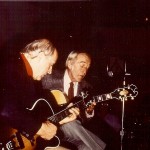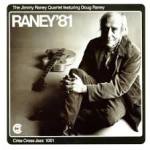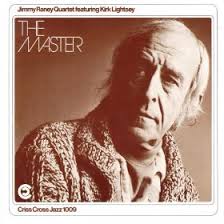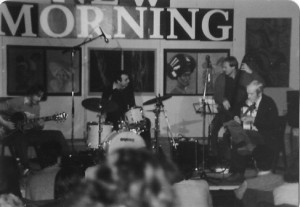The Master in the 80’s – part 1
page 1 | page 2 | page 3 | page 4 | page 5 | page 6 | page 7 | page 8| page 9
On the heels of the previous decade, Jimmy was becoming quite sought out thru the 80s – getting regular calls for gigs at top NYC clubs, new record opportunities and tours in Europe, both for music venues and teaching. He was now a “re-established” master. Most notably during this time he had his alcoholism much more in check. In fact I would say for a greater part of the 80s, the issue was under control with few relapses.
In 1980, he recorded the album, Here’s that Rainy Day in France with his old cohort, Hank Jones, bassist Pierre Michelou and drummer Jimmy Cobb. Dad wasn’t thrilled with record, but mostly blamed himself for the performance flaws. Curiously, he said he felt almost intimidated by his old cohort Hank Jones whom he held in the highest regard. Generally I think the record was poorly recorded.
Jimmy and our family through the years maintained a close relationship with Attila Zoller. Although different personalities Jimmy and Attila’s relationship was mutually beneficial. My father was not a go-getter in terms of getting work. Attila was and with the promise of the great Jimmy Raney also on the gig it helped make the sale. Attila made things happen. He booked gigs for the two of them in Bradley’s. They went to Germany in 1980 and they recorded the duo album “Jim and I” and there is a video DVD of it above.
In 1981, I started thinking seriously about playing jazz. I went down to visit with Dad in Louisville (He had moved back to Louisville at that point). Dad, Ola Miracle and I drove all way from Louisville to Brattleboro, VT. There Dad was the guest artist in residence in Attila Zoller’s jazz clinic, which later became established as the Vermont Jazz Center. The late guitarist Jack Fragomeni also was teaching, along with Attila. In the clinic I learned quite a bit about my abilities – or lack of them – and listening to my father teach that was truly an experience.  The guitarist, Draa Hobbs was also there to witness it.
The guitarist, Draa Hobbs was also there to witness it.
Jimmy talked alot about his polymetric approach and demonstrated his signature lines counting in 6/4. This was something that was percolating for him – how to explain what it was that he was doing in teachable terms. His playing was over the top great at this point. There was no one better. This was obvious to anyone that listened, student or professional alike. When Jimmy launched in “All The Things You Are” it provoked Attila to say in a self-deprecating way, “Who the fuck am I to teach anyone, Charlie Parker just stepped into the room.”
One thing I recall about the experience was that my talent for comedy improv suddenly surfaced. I suddenly launched into a routine, “How I Invented the Blues” with Dad and Ola watching. The routine was loosely based on some video I saw of Dizzy Gillespie describing how he wrote “Night in Tunisia” I think. I was possessed and it was just coming out of me. My father laughed more loudly than I had ever heard him laugh. He asked me to repeat the routine later on a few occasions but I told him I couldn’t. I don’t really remember what I did and it was spontaneous.
This concept reminds me a lot about my father’s improvisational style. Although the notes are important its his immersion into his own lines that is key and being “in the moment.” You were drawn in to his lines because he was drawn into his lines. Barney Kessel described it as though Raney were writing a note to an intimate friend through his guitaring.
In 1981, be recorded for Gerry Teekens the album, “Raney 81”. For me this was his best record since “Two Jims and Zoot”. The opening on “What is Thing Called Love”
Audio Playeris a tour de force and there are so many winner solos on it, “If I Should Lose You”, “Sweet and Lovely”, Bill Evans “P eri’s Scope” , “This is New” or “My Shining Hour” that is really difficult to decide for me which is my favorite. Doug in my view was more in a supporting role on this record and he does it amazingly. I listen to his comping a lot on this record. It’s telepathic. From a solo perspective I don’t hear him as sounding comfortable like he was on “Stolen Moments”. I think much of this was the studio experience plus he was using his Ibanez not his fav guitar the L7 if I remember correctly. Dad’s sound is markedly different than on prior records.
eri’s Scope” , “This is New” or “My Shining Hour” that is really difficult to decide for me which is my favorite. Doug in my view was more in a supporting role on this record and he does it amazingly. I listen to his comping a lot on this record. It’s telepathic. From a solo perspective I don’t hear him as sounding comfortable like he was on “Stolen Moments”. I think much of this was the studio experience plus he was using his Ibanez not his fav guitar the L7 if I remember correctly. Dad’s sound is markedly different than on prior records.
Many people disagree with me but I’ve gone on record saying that I always found Doug’s support for Dad more flowing than the other way around. Doug’s comping style with muted tones and subtle rhythms (adapted to a degree from the style of Jim Hall) were particularly propulsive. In his solos, Doug always spiced behind the beat more and Dad comped more on the beats so to my ears this created some tension in the groove during Doug’s solos.
In 1983, Jimmy toured with Doug in France. They did both concerts and clinics. Below is a photo from the famous Paris club, New Morning. The personnel is the same as on Raney ’81 with Jesper Lungaard on bass and Erik Ineke on drums. Dad did his 2nd album for Criss Cross Jazz records, The Master with Kurt Lightsey and Eddie Gladden, while Doug recorded his
Meeting the Tenors. Dad had issues with the record because of the tempos (his frequent complaint in music even directed at established musicians) and the drum levels. Doug did his best to assist with the record sound-wise as his own record clearly was solid on all counts. Still many people enjoy the more high-powered lineup in spite of its faults. His solos to on “The Song is You” and other cuts is worth the price of admission.
I think there is much to like on the record despite some of the mismatches. And I always liked Kirk Lightsey even if this wasn’t his best outing. I think my father plays interestingly in situations where he is pushed a bit. The same thing could be said to a degree on “The Influence” for example. Where Sam was close to running away with the beat on “I Love You” but doesn’t. This one also was really Gerry Teekens ode to Dad whom he felt (like Schlitten) was someone deserving wider recognition. So great detail is gone into in the liner notes to show and support Raney’s unsung master status. Interestingly Jimmy was able to poke fun at this whole general issue in his humorous piece: published a few years back in my blog: How I Became a Living Legend
Doug and Jimmy would do one more record during the period, Nardis which is another fine duo effort pretty much picking up where they left off on Duets. My general observation on the Jimmy & Doug outings was that Doug deferred to Dad as the unspoken leader, and almost changed his style to suit Dad, including repertoire and chord changes.

Typical guitar duets often fall apart time-wise unless somebody starts strumming four-to-the-bar or heavy up and down strumming. They didn’t do that and things always flowed along. Unfortunately however, my father’s and Doug’s relationship went south after their gigs together in Europe as Dad during one stint fell into alcoholism again. They would not reunite until 1993 (More on that later).
In 1984, in a visit to a Nashville, Jimmy’s playing was captured live on video – a rare occurrence (see my Youtube channel for available videos to the right). The bassist is Jim Ferguson and drummer is Claude Ranger. The most notable characteristic of the videos are the intense focus on Jimmy’s fingers. This is a particular treat for guitarists fascinated by his technique. For this, we have to thank the obsessiveness of the videographer, Bucky Barrett.
1985 was marked with my own reuniting with my Dad. At that point in my life, I had recently been laid off from a job and took up an offer from my Dad and his companion, Ola Miracle to live with them and become a more serious musician. I had made some progress over the years in college but was no where near where I needed to be. I had a lot of opportunity there to practice. I had Ola’s piano and also access to Bellarmine College piano practice rooms. My father would subtly come in on me and check my progress. The fact of the matter was my father’s judgement of my playing made me deathly afraid. My brother had suffered through it in the 70s as well but when we had went through it he had my father’s gift for nearly perfect time. I had many of the same issues – minus the perfect time. He would never really said anything to me directly, only if I asked him.
One time I just asked him to comment on my playing. So I did some solo improvising, he listened and then commented. What he said to me has stuck with me this day. It was basically, highly detailed nonsense. Paraphrasing what he said was it was roughly, “So then I said… but I asked you… then you went there and then I said…You know what I mean?” I responded, “What? I don’t understand”. He said, “Exactly”. Still tasked with deciphering the meaning, I pondered it a bit. I then said, “You’re trying to say I my (musical) statements are not connecting or making sense?”. He nodded.
Grasshopper learned his first big lesson. I will continue this and other events from the 80s in the next chapter.
page 1 | page 2 | page 3 | page 4 | page 5 | page 6 | page 7 | page 8| page 9
4 Comments
Chris Lohnes
Great read, Jon. That’s a lot of work you’ve put in on this site. Thanks.
Jon Raney
Thanks Chris
Appreciate your comments on my site
Best wishes
Jon
John McCain
Hi Jon – I’m delighted to have found your site.
I love your Father’s playing and in the mid-’80s I would speak with him on the phone and ask questions about his playing and ideas
He was very friendly and helpful but it was sometimes difficult as he told me his hearing was a real problem at that time.
I would really have to speak up when talking on the phone with him.
Thank you for all the great information you’ve posted here.
I’ll return often to dig deeper.
Your Father was indeed one of the Greats !
Best Wishes – John McCain
Jon Raney
Hi John,
My father was a fascinating person and musician. Any conversations with him really stick with you. He was just that type of person. Glad to hear it from someone who is not biased:)
Cheers,
Jon